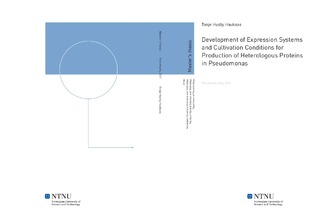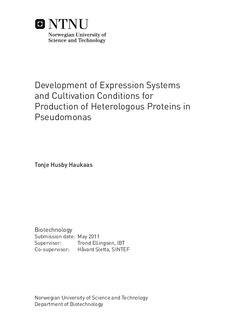| dc.description.abstract | This study has been part of the project Development of versatile bacterial expression systems for use in recombinant protein production, metabolic engineering, and systems biology , a collaboration between NTNU, SINTEF (Department for Biotechnology) and SU (Saarland University, Germany). The major goal of both the project and this study was to develop and apply advanced biological tools for control of gene expression. Recombinant DNA, created by artificially producing genetic sequences, can be transferred to microorganisms and change their properties. One new possible property is the production of specific recombinant proteins, which have potential for use in both industry and medicine. The most intensely studied and attractive heterologous (recombinant) protein producer is to date E. coli. Although there are several advantages using E. coli, some of its related disadvantages can cause low volumetric yield of specific proteins. When this occurs, there is a need for alternative producers and therefore a gene expression system that functions in diverse bacterial species. The Pm/XylS expression cassette, which has proven useful for industrial level production of recombinant protein, is used as a basis for this study s expression system. Expression vectors harbouring Pm/XylS and genes for the human proteins IFN-alpha2b and GM-CSF were constructed. Protein expression from these vectors was evaluated in Pseudomonas species under different cultivation conditions. During cultivations of P. fluorescens SBW25 in shake flasks, instability of the relevant expression plasmids was detected. Evaluation of alternative Pseudomonas strains revealed that the same plasmids were stable in P. putida KT2440. Furthermore it was found that P. putida KT2440 was easy to cultivate in both rich and minimal media, and it was therefore chosen for further use in this study. Production of IFN-alpha2band GM-CSF from KT2440 was obtained under optimized shake flask experiments and fed batch fermentations, but in low quantities. To further examine KT2440s production potential, the expression plasmids was genetically engineered. This was done by incorporating a copy number mutation and codon optimizing target genes and signal sequence pelB. Exchange of trfA (the gene for replication protein TrfA) with trfAcop271C yielded approximately 3.5-fold increase of plasmid number in KT2440, the same as previously reported for E. coli. After this modification, the production of both model proteins was estimated to have increased 3.5-fold or more. Additionally, soluble IFN-alpha2b was detected, which was not reported for E. coli under the same conditions in a previous study. Codon optimization of the target genes and signal sequence did not have expected effects on protein production in KT2440 under conditions tested, when compared to wild type copy number expression plasmids. Combination of codon optimized sequences and increased copy number had negative effect under the conditions tested.Further evaluation of the genetically modified expression plasmids was performed in fed batch fermentations of KT2440. Plasmid stability was found to be high, but the protein production obtained was lower than expected from results in the previous shake flask experiment. During fed batch fermentations, an observed increase in metabolism at induction indicated that the inducer was consumed. Since induction here is performed when substrate is limited, in contrast to the conditions in shake flask experiments, it is possible that the inducer is metabolized instead of inducing protein production. This would explain the observed differences in production and should therefore be tested. P. putida KT2440 have through this study proved as a potential industrial protein producer based on its growth properties and the fact that simple genetic modifications of expression plasmids proved to positively affect the production of model proteins. | nb_NO |

